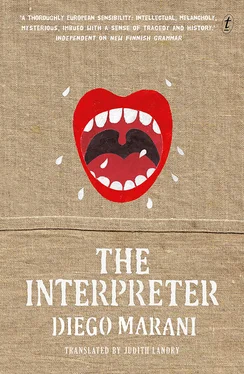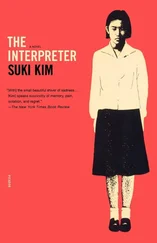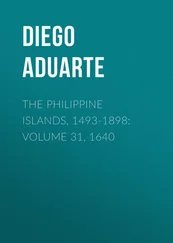‘I know that man!’
Seized with a sudden fit of dizziness, I almost fell; a sailor caught me and sat me down on a nearby bench. Someone undid my shirt and gave me some smelling salts.
‘Barnung’s his name, Herbert Barnung,’ I murmured, before passing out.
When I came to, I found myself in a first-aid post in Tallinn harbour; a worried-looking doctor was taking my blood pressure. He shook his head and said something to a nurse seated at the other side of my camp bed.
‘The doctor is asking whether you suffer from any illnesses,’ she said stiffly in German. With some difficulty, I sat up.
‘No, absolutely not. I have to go now!’ I said, in something of a panic. The less time I spent here, the better, it seemed to me.
The doctor talked on, this time at length. Looking gravely first at me, then at the nurse, he shook the thermometer and pointed his finger at his blood pressure machine. The nurse just looked at me sadly; all she said was:
‘The doctor says you’re very ill!’
I got down from the camp bed and picked up my clothes from the chair. The doctor unbuttoned his gown and left the room. The nurse put up a screen and sat waiting for me at a small green desk.
‘Where is Dr Barnung?’ I asked brusquely.
The nurse shook her head and looked at me expectantly.
‘The drowned man! The one they fished up from the sea!’
Then the nurse nodded, stood up and took me into the next room, where I found the sailor who had come to my aid, together with an officer from the harbour office.
‘How are you feeling?’
‘Better, thank you.’
‘All in a day’s work. A drowned man is never a pretty sight!’ he added, perhaps hoping to make me feel better, then went on:
‘So, you knew this man?’
‘I did. His name is Herbert Barnung. He’s a neurologist — a German citizen, from Munich,’ I replied with bitter certainty.
The sailor and the man from the harbour office exchanged puzzled looks; passing a plastic package one to the other, they briefly conferred. It was the nurse who spoke next; she took a passport out of the package and handed it to me.
‘There must be some mistake, sir. This is the passport we found in his pocket.’
I opened the sodden document and leafed through it. Under Dr Barnung’s photograph I saw the words: Mirko Stolojan, born Kaliningrad 28 August 1946, which caused me promptly to sit down in the chair again and run my hand over my forehead; seeing me do so, the nurse offered me a glass of water, which I downed in a single swallow, then sat there staring at the two men. The sailor scratched his nose, then gazed into space; the man from the harbour office put the passport back in the folder and shrugged.
‘All in a day’s work. A drowned man is never a pretty sight!’ he said again with an embarrassed smile.
It was only the beginning of August, but Tallinn had the air of a city whose tourist season was drawing to a close. The bus I’d taken from the harbour drove through the outskirts, then into a residential area with a lot of greenery, on the west side of the bay. In the distance I could see the outlines of low, sandy islands, covered with shrubs. The ferries lined up in the harbour were all empty, their gangways cordoned off; on board, a few listless hostesses were sitting around chatting at a table on the empty deck. A quiet sea lay under a clear, cold sky; small waves were lapping against the quay. The low afternoon light was falling on the trunks of the silver birches, and the woods seemed alight with an eerie glow. Beyond the wooden landing stages, amidst sandbanks dotted with thorny plants, a fragile canebrake was bowing silently, ruffled by a light wind blowing from the moss-strewn shore. Seated on the harbour wall, an old man was fishing, the line he held wound around his fingers catching the light like a thread of cobweb underneath a pine tree. On the quay, amidst the orderly tubs of geraniums, an ice-cream seller was polishing the brass fittings of his cart; then he put down his cloth, leaned over the lid and rubbed out strawberry and chocolate from the list of flavours written on the glass. All he had now was vanilla. It was a windy Sunday afternoon, scented with sugar and shoe polish. The sound of a barrel organ wafted in fitfully from the funfair on the narrow strip of pinewood that closed in the bay. My eye was caught by the mirrors of a roundabout glinting in the sun, and I decided to follow the crowd attracted by such merriment.
At the entrance, a cluster of coloured balloons were swaying in the wind; a child grabbed at the balloon seller’s wrist and pulled on the string of one of them, looking beseechingly towards his mother. A girl was handing out blue paper flags; now every family was sporting one, slipped into their caps, attached to their rucksacks or fixed to a pushchair. I followed the crowd of jostling children, who were constantly tripping each other up as they paused to pull up their sagging socks, jumping around and dropping sweets from their bursting pockets. Once inside, I was enclasped in a damp warmth; there was a smell of chlorine and sodden wood. The uproar from the floor below rose and fell in volume as though those who were making it were cheering on the runners of some unseen race. Up here, people were scurrying between two barriers, moving in the direction of the ticket office. I stared blankly at the writing above the various windows, noticed a green light flashing on and off. I proffered a banknote to the woman at the till and took my ticket, allowing myself to be jostled by the crowd in the direction of a blue glass door. Such was the crush that I couldn’t see anything directly in front of me, but beyond the door, which led into a large circular room surrounded by banked-up steps like a stadium, I could see the glimmer of water reflected on the ceiling; I realised that I had ended up in a covered swimming pool, where some competition was being held, and I was just about to turn tail in disappointment when my attention was caught by a board with coloured writing on it. As I gazed uncomprehendingly at the odd letters of that unknown language, I had the sudden feeling that in fact they contained something that was known to me. I stepped forward for a better view and read, in fine Gothic letters:
Vancouver
San Diego
Papeete
Vladivostok
Pusan
Taipei
Surabaya
Durban
Eilat
Constanta
Odessa
Klaipeda
Tallinn
Elbowing shocked mothers out of my path, and being roundly insulted in return as they tried to shield their delicate offspring from my violent advance, I now turned round and carried on with my attempt to approach the pool; I received rabbit punches, someone grabbed me by the scruff of my neck, but my devilishly sharp elbows got the better of them. I stumbled, and got back on my feet; dragging myself along the wall, I found myself at last beside the pool.
And there he was, standing on a dais in the middle of it; waiting until everyone had fallen absolutely silent, he slowly raised his arms, threw back his head and uttered a long whistling sound, almost a howl, which rang out in the air for a few moments, setting my eardrums pulsing, then subsided into a quieter gurgling sound, only to rise again into a cheerful twitter. At that same moment, four dolphins leapt out of the water and swam towards him, flapping their flat tails; raising their snouts, their mouths half-open as though they were laughing, they answered him with that same whistle. The interpreter lowered his arms again, and the gurgling became a deep growl; the dolphins fell silent and sank back into the water, propelling themselves off to the four corners of the pool with quick flicks of the tail, their dorsal fins flashing along the surface of the water, then executing a quick tour of the water before once more arranging themselves around the dais, raising themselves on their tails. Encircling the interpreter in their hypnotic dance, they opened and shut their mouths, waving their pectoral fins and shaking their sides, their eyes on the now silent man. Motionless, chin lowered, he himself was beginning to look like one of them: his chest seemed marked by the same yellowish, keel-like ridges as their own, his calves were puckered with the same grey stalk-like structures as those which swelled out at the base of their caudal fins. Almost as one, the four creatures emitted a low, moaning sound, then slid silently to the bottom of the pool; the interpreter raised his arms again, puffed out his hairless chest and let out four different-sounding whistles, jerking his head in each of the four directions as he did so. He was staring into the middle distance, his mouth pursed and his neck as swollen as that of a snake about to strike, stretching out his fingers and lifting his elbows slightly, as though about to take flight. The people on the stands were gazing at him in silent amazement. I sniffed the air, awaiting the usual bitter stench, which did indeed soon envelop me; strangely, though, I noted that it was no longer one of wood and resin, but rather of brackish seaweed, of the insides of dead shells, of the cold depths of the ocean; the smell of the narwhals from Klaipeda, of the yellow mud inside the wreck in Odessa. After a few moments, one by one the dorsal fins reappeared on the surface, and the creatures again started leaping up in front of the dais, their movements perfectly in time with the interpreter’s whistles. They dived down again, and after swimming around for a while they lined up on one side of the pool, turning their impenetrable black eyes towards the stands. Heedless of the frantic applause, the interpreter was still staring into space with a haunted expression on his face, arching his shoulders and moving his mouth as though it were a beak. It was then that he caught sight of me, clinging to a railing, paralysed by fear. He leaned forwards on the dais and waved his fist in my direction, shouting out triumphantly:
Читать дальше












